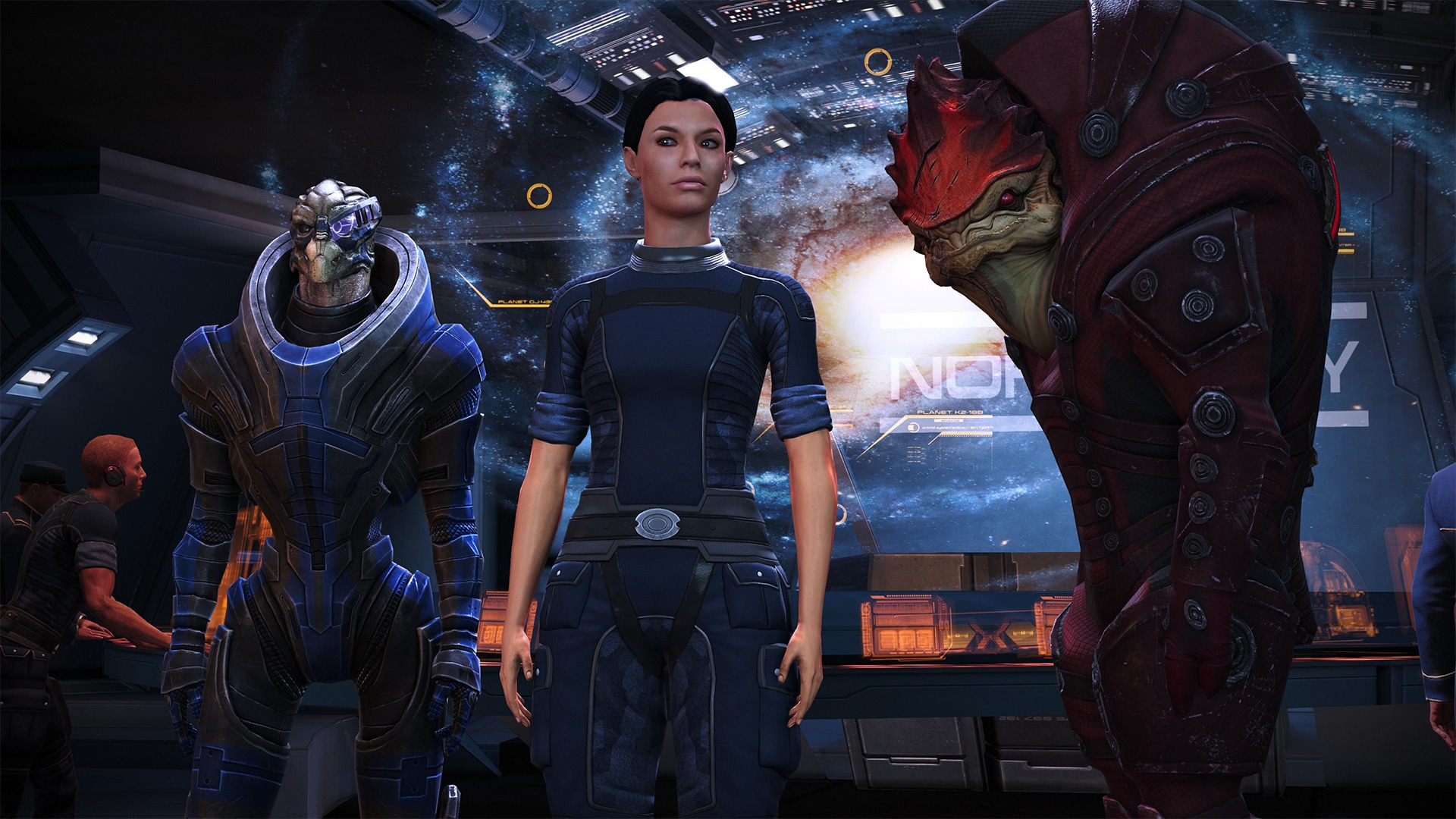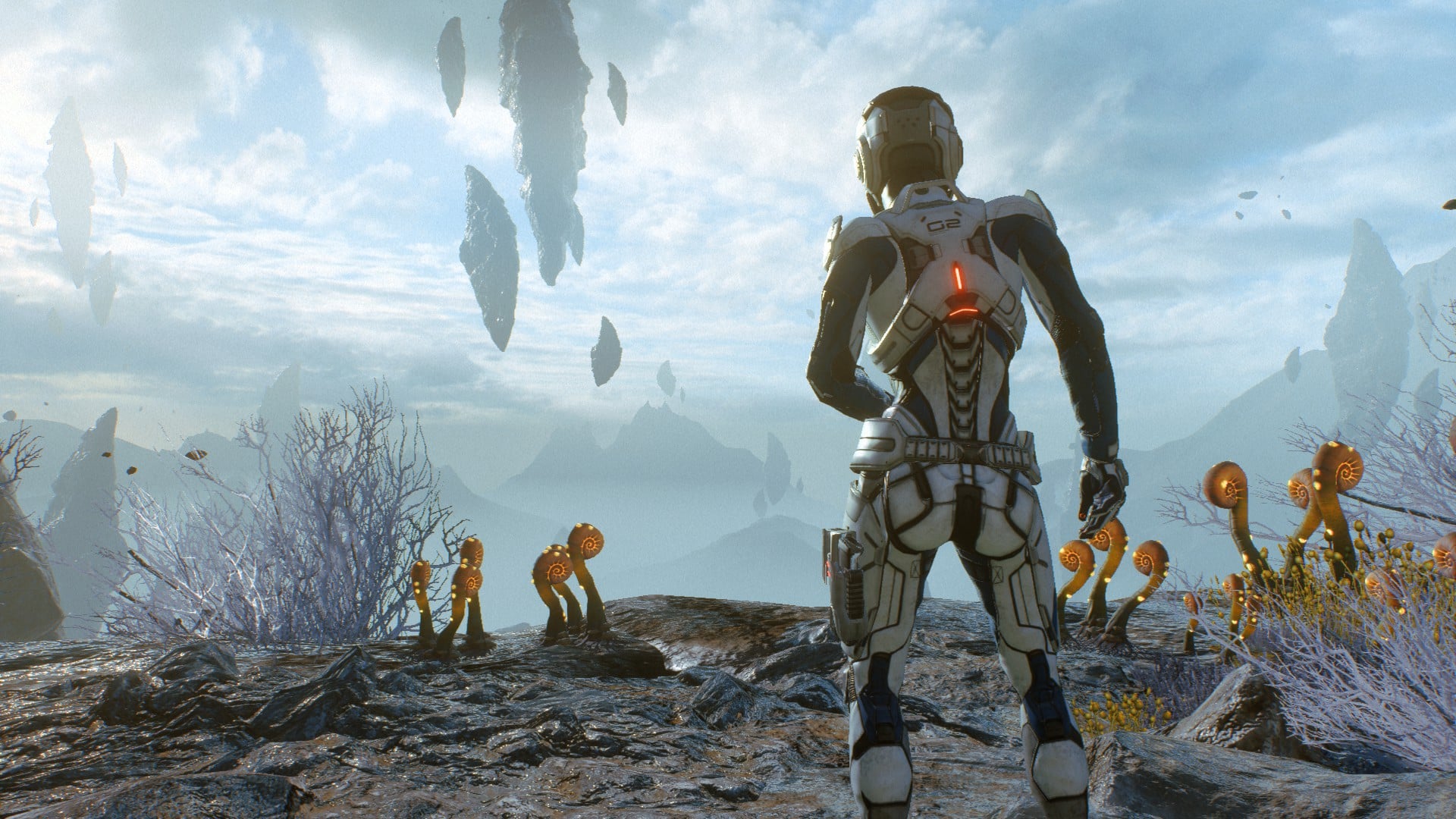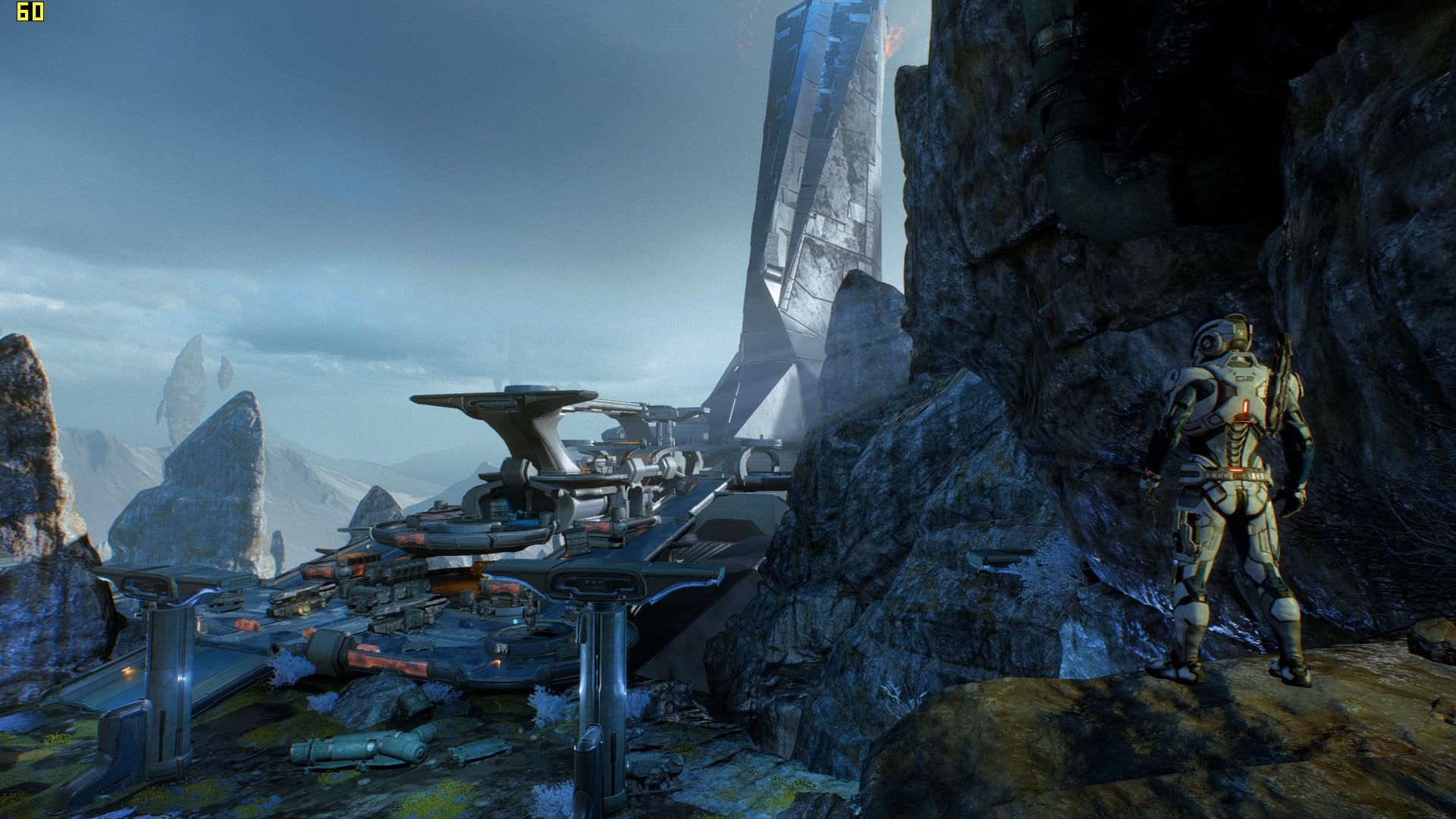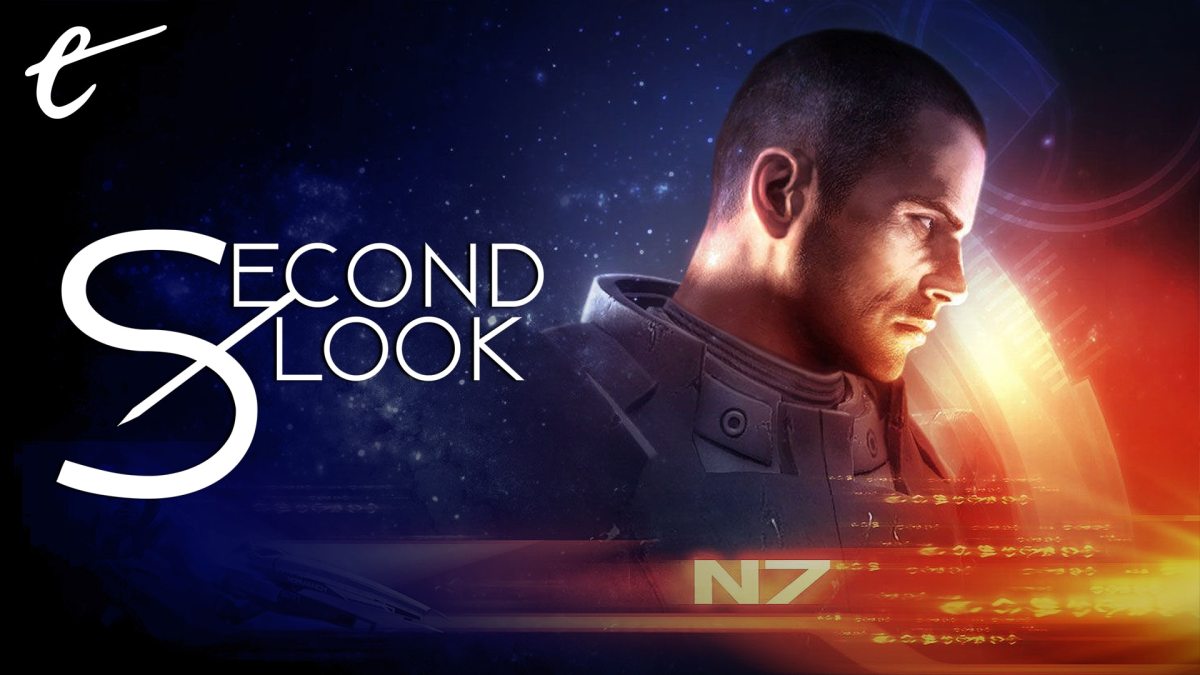Mass Effect 1 is a foundational piece of work by BioWare. It established the future of the developer’s games, charted a way for RPGs to be something other than isometric CRPGs, and boldly explored a boatload of complex ideas for its time — “for its time” being the key factor. The industry as a whole may have plenty of hidden and famous gems that stand out to this day, but even as a huge fan of Mass Effect, I see the first game has aged, which is all the more evident after having recently revisited Mass Effect: Andromeda.
The original plans for Mass Effect 1 were much more ambitious than what appeared in the final product. BioWare had wanted online multiplayer functionality, vaster worlds, and dialogue interrupts, all of which Andromeda enjoys. Combat went through considerable trial and error before settling on its third-person shooter design as well.
BioWare also took a while to find its way with the narrative, and there’s an emphasis on heavy-handed moral choices based around racism that make you a clearly awful person if you go Renegade. Given BioWare’s access to data on player decisions, player reluctance to go Renegade likely informed the writing for the rest of the trilogy. Indeed, the trilogy was constantly evolving over time, so it’s reasonable to imagine Wrex and the Rachni’s importance were vastly enhanced by players’ Paragon preference. If players had killed either party off in a typical playthrough, there would have been less incentive for BioWare to make them matter later.
As it is, a good third of the Renegade dialogue choices in Mass Effect 1 are indefensible, but the problems extend to the Paragon choices too. Shepard’s Renegade options are often rooted in racism, whereas Paragon options are purely about sacrificing human advantage at any cost to support the Citadel’s alien inhabitants. Why is it a heroic Paragon choice to sacrifice a significant chunk of humanity’s fleets to save just one ship holding a council of bigoted skeptics, for instance? It demonstrates that trying to bind these sorts of sensitive issues to a binary morality leads to questionable messaging, whether intended or not.

These restrictions extend to the romance subplots as well, with Liara and whichever human crewmate is your gender opposite both instantly taking your interest in them as physical attraction. Though impressive at the time, the rate these romances evolve from friendship to fooling around is staggeringly fast.
Also, Legendary Edition or not, the combat in Mass Effect is a mess. This was BioWare’s first shooter since MDK2, and it shows. While one can appreciate the greater emphasis on physics and biotics working regardless of enemy shields, combat still isn’t that enjoyable. The inventory management is also cluttered by filler items that are just minor stat differences with the odd different firing mode. And while Mako’s many issues go without saying, the Uncharted Worlds side activities were typically threadbare at best, copy-pasting assets. Every aspect of Mass Effect is constrained as it struggles against itself, various systems fighting against one another for dominance.
Mass Effect 2 would avoid such struggles with its incredibly narrow focus on improved combat, better dialogue choices based on more personal situations, and briefer exploration vignettes that threw out the Mako entirely. However, when Mass Effect: Andromeda came rolling around, its dev team had lots of new blood who had only worked on DLC expansions for the preceding trilogy. They looked to past ideas for inspiration and ended up trying to accomplish many of the same things past development teams had fumbled with. Yet, for however troubled its development was, I can’t help but feel like time has been kinder to Andromeda overall.

Mass Effect: Andromeda’s handling of similar themes of racial tension is immensely more refined. Ryder’s choices aren’t galaxy-defining, but they often display more nuance, written from the perspective of whether you make the colonist-centric or globalist-centric choice. You can see why Ryder opts for them. It’s possible to be a true ally to the Angara and then be a hypocrite with the Krogan without it feeling disingenuous. You might make a particular call the Angara don’t agree with out of their own self-interest while otherwise being respectful. It leads to a series of choices that are not opaquely good and evil, ensuring you can’t just choose the “be nice” option at every turn.
The game still struggles to make exploring entire vast expanses of a planet engaging, but Andromeda’s environments at least demonstrate greater variety. Some require you to go wholly on foot. Others have unique environmental hazards. The starting zone Eos even introduces you to a region you might’ve otherwise skipped thanks to a murder mystery sidequest, and Eos is the driest planet (in more ways than one) in Andromeda. Though you lose access to ranged weapons in the Nomad, the added traversal challenge taps into some serious Death Stranding energy. Getting over a mountain is no longer a chore, but a genuinely engaging challenge.
Andromeda also vastly improves upon combat. Though the decreased squad input is disappointing, Ryder is a devastating whirlwind of a biotic, a brutal frontline soldier, or a tactical engineer — or any combination in-between. Granted, removing static classes comes with trade-offs, but so does providing a generic Soldier class that 40% of players default to using. The combat movement system also mines the series’s depths as an action experience in addition to respecting the role-playing.
Inventory management returns, but thanks to importing the much wider and more distinct selection of weapons from Mass Effect 3 and the brilliant crafting system, Andromeda doesn’t waste your time with nonsense. Speccing out Ryder is so much more satisfying knowing you fine-tuned their kit to maximize their potential. It’s what everyone complaining about Mass Effect 2’s streamlining was begging for, and it needs to return in the next Mass Effect. Plus, not having to micromanage your squad’s gear removes additional hassle.

Meanwhile, romantic subplots take place over the whole journey with unique little side quests. Paired with the return of loyalty missions, your crew aboard the Tempest get far more moments of interaction, both with you and on their own. Seeing as the game was written by some of the people who wrote great character-heavy experiences in Mass Effect 3: Citadel, it’s no surprise this remains one of Andromeda’s greatest advantages. Even with a weaker overall plot, Andromeda still bears the signature of a BioWare RPG in its writing.
Perhaps the most bittersweet aspect of Andromeda is that, like Mass Effect 1, it was planned to receive post-launch support, with the phantom limbs of such expansions left lingering in the background. Where Mass Effect only received Bring Down the Sky and Pinnacle Station — the latter often considered the worst DLC in the franchise — Andromeda was set as a prime game for post-launch expansion. The colonial setting and unanswered questions left the perfect space for an evolving game that could have grown over time for months afterward, not unlike with Star Wars: The Old Republic.
It’s undeniable that Mass Effect 1 was a massive influence on the RPG landscape as a whole. Andromeda wouldn’t exist without it, both at all and due to its heavy influence on its successor’s design. The trilogy as a whole remains a masterpiece, bolstered by BioWare’s continual efforts to evolve its approach with each successive game. To say Mass Effect 1 hasn’t aged well isn’t a condemnation of what came before, but rather speaks to how far BioWare has taken its craft after all these years.







Published: Aug 19, 2021 11:00 am